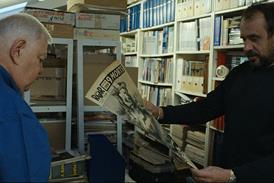Dir: Danny Boyle. UK. 2002. 113mins
When daily newspaper headlines are more frightening than anything fiction can devise, 28 Days Later may find that audiences prefer the comfort of frivolous escapism over an ambitious slice of end-of-the-world mayhem. A serious-minded, sloppily plotted homage to such 1970s fantasy genre giants as George A Romero and David Cronenberg,it fails to add any significant new elements to the apocalyptic chiller territory staked out in countless features from The Crazies (1973) and Mad Max (1979) to this year's Reign Of Fire and Resident Evil.
The initial promise of a Britain ravaged by a mystery virus and populated by vile-tempered, blood-thirsty armies of the infected eventually degenerates into over familiar, overwrought genre staples. A smart and stylish UK marketing campaign should ensure a strong UK opening on November 1, which is unlikely to be sustained by either universal critical enthusiasm or word of mouth. The absence of star names and the gritty digital aesthetic are likely to further limit international prospects.
Director Danny Boyle's previous theatrical feature was the Leonardo DiCaprio vehicle The Beach based on the bestselling Alex Garland novel and adapted for the screen by John Hodge. Here, Garland provides the original screenplay and his inexperience shows in the unconvincing dialogue and weak sense of characterisation.
The story begins when a group of activists break into a Primate Research Centre and liberate the caged monkeys. A terrified scientist claims they are infected with a rage-inducing virus that is passed on in blood and saliva. Why they are infected and why there is no antidote are among the many questions that are ignored in the onward momentum of the narrative.
Twenty-eight days later, accident victim Jim (Murphy) awakens. Naked and wired to various tubes and drips, he discovers that he is all alone in a completely deserted hospital. When he dresses and ventures outside, he discovers that London is eerily empty. The most effective scenes in the film echo Vanilla Sky as he stumbles through the silent, abandoned landmarks of a major city. Entering a church, he is attacked by a rabid priest and saved by two of the few healthy people still alive. The cynical Selena (Harris) explains that the virus has spread throughout the country and maybe even the world - there is no electricity, no media, no seat of government and no hope of rescue. 'Plans are pointless,' she asserts. 'Staying alive is as good as it gets.'
Jim and Selena eventually form a makeshift family with Frank (Gleeson) and his daughter Hannah (Burns), and travel north to what appears to be a safe haven of a military headquarters under Major Henry West (an embarrassed Eccleston). Any lingering credibility flies out the window as the headquarters fends off attackers and we are asked to accept Jim's transformation from cadaverous bicycle courier to one-man killing machine as he does battle against the enemy within. The dark, rainswept setting, digital filming and agitated editing sometimes makes it difficult to discern exactly what is going on.
Shock tactics do provide a number of frightening moments and there are also attempts to step back and examine the emotional toll of such a nightmare scenario. The end result still lacks a coherent sense of what the film is trying to achieve. There isn't sufficient gore or ghoulish humour to completely satisfy genre addicts but the intellectual element or social comment is not provocative enough to win over the kind of audiences who would normal avoid the genre. After all the doom and death, the happy ending feels like an afterthought.
Prod cos: DNA Films, Film Council, Fox Searchlight
UK dist: Fox
Int'l dist: Fox
Prod: Andrew Macdonald
Scr: Alex Garland
Cinematography: Anthony Dod Mantle
Prod des: Mark Tildesley
Ed: Chris Gill
Music: John Murphy
Main cast: Cillian Murphy, Naomie Harris, Brendan Gleeson, Christopher Eccleston, Megan Burns



















No comments yet